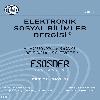İlköğretim Öğrenci ve Velilerinin Nöro Linguistik Programlamanın (NLP) Sınıf İçinde Uygulamalarına İlişkin Görüşleri
Bu araştırmanın amacı, ilköğretim öğrenci ve velilerinin NLP’nin sınıf içi uygulamalarına ilişkin düşüncelerini belirlemektir. Araştırmada nitel yöntem kullanılmıştır. Araştırma 2005-2006 öğretim yılında Gaziantep Özel SANKO ilköğretim okulu 2B sınıfında yapılmıştır. Veriler öğrenci ve veli konuşmaları ile öğretmenin kayıtlarından oluşmaktadır. Araştırma sonuçlarına göre, öğrenci ve velilerin NLP ile ilgili düşünceleri olumludur.
The Opinion of the Elemantary School's Students and Parents About the Application of the Nero Linguistic Programming (NLP) in Class
The aim of the research is to determine the opinion of the elementary school’s students and parents about the application of the NLP in class. In research qualitative methods was used. The research was made the 2B class of Gaziantep Private SANKO Elementary School in 2005-2006 academic calendars. According to research results, the opinion of the students and parents is positive.
___
- Alder, H. (2004). Yaratıcı Zekâ. Zaman M., ve Avşar C. ( Çev), :Hayat Yayıncılık, İstanbul, ss.35, 106.
- Biçer, T. (1999). NLP Kişisel Liderlik. Beyaz Yayınları, İstanbul, ss.10-11.
- Blackerby, D. A. (2006). Using Neuro-Linguistic Programming (NLP) In The Classroom. www.rediscoverthejoyoflearning.com/nlpclassroom.cfm (Erişim:12.02.2006).
- DePorter, B. Hernacki M. (2000). Quantum Pathways Discovering Your Personel Learning Style. Learning Forum Publications, Oceanside, California, s.32.
- Knight, S. (2001). NLP Solutions: How to Model What Works in Business to Make It Work for You. Nicholas Brealey Publishing, London, s.88 .
- Knight, S. (2004). NLP at Work: The Difference That Makes a Difference in Business. Nicholas Brealey Publishing, London, ss.154-164.
- Markova, D. ve Powell, A. (2002). Çocuklar Nasıl Öğrenir? NLP ile Çocuğunuzun Zekâsını Geliştirin. Kuraldışı Yayıncılık, İstanbul, ss. 28,58-59,76-77,78-79,80,88,100,120,130.
- Watson, R. (2004). NLP Practitioner Manuel. INLPTA, s.5.
- Yero, J, L. (2001a). NLP and Education: Part I -- A Shift of Focus. Anchor Point - The Practical Journal of NLP 15(9).
- Yero, J. L. (2001b). NLP and Education--Part 2 The Influence of Teachers’ Beliefs. Anchor Point - The Practical Journal of NLP 15(10).
- Yayın Aralığı: Yılda 4 Sayı
- Yayıncı: Cahit AYDEMİR
Sayıdaki Diğer Makaleler
Atınç OLCAY, Kurban ÜNLÜÖNEN, Müjdat ERTÜRK
Gökçeada-Yenibademli Höyük Kazısında Bulunan Makara
Bazı Özel Öğretim Yöntemlerinin Lineer Cebir Öğrenimine Etkileri
Türkiye'de Koruma Yasalarının Tarihsel Gelişimi Üzerine Bir İnceleme İnceleme
Can Tuncay AKIN, D.Türkan KEJANLI, Aysel YILMAZ
Bilgi Toplumu Bağlamında Türk Atasözlerinde “Eğitim” ve “Bilgi” Kavramları Üzerine Düşünceler
Mıhlı Çayı Havzası'nın Jeomorfolojik Özelliklerinin Jeomorfik İndislerle Analizi
Ninive 5 Kültürü'nün Güneydoğu Anadolu Bölgesi'ndeki Yayılımı
